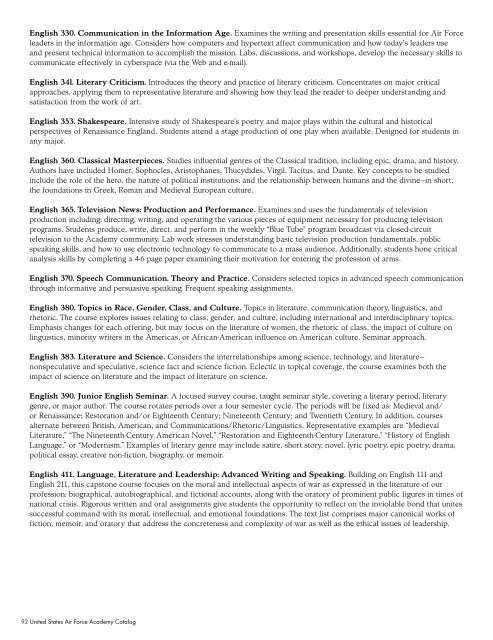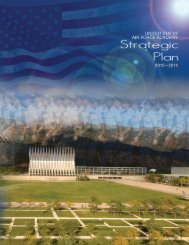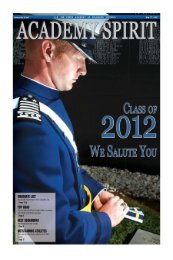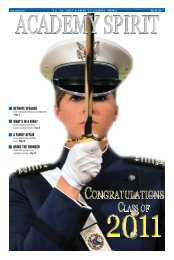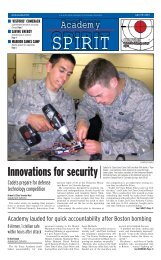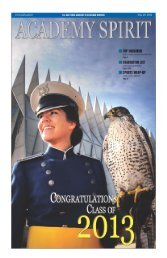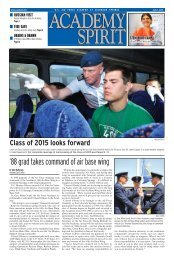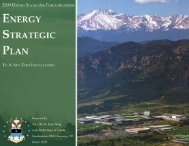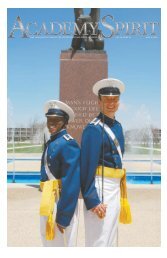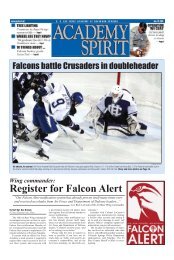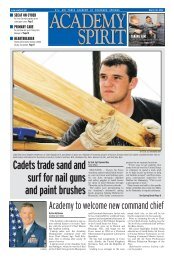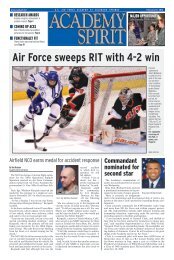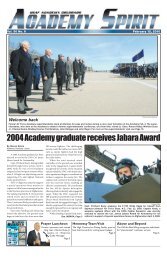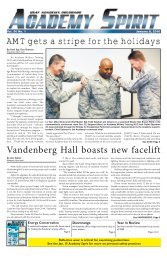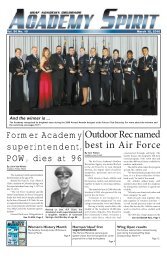2008-2009 Catalog - United States Air Force Academy
2008-2009 Catalog - United States Air Force Academy
2008-2009 Catalog - United States Air Force Academy
You also want an ePaper? Increase the reach of your titles
YUMPU automatically turns print PDFs into web optimized ePapers that Google loves.
English 330. Communication in the Information Age. Examines the writing and presentation skills essential for <strong>Air</strong> <strong>Force</strong><br />
leaders in the information age. Considers how computers and hypertext affect communication and how today’s leaders use<br />
and present technical information to accomplish the mission. Labs, discussions, and workshops, develop the necessary skills to<br />
communicate effectively in cyberspace (via the Web and e-mail).<br />
English 34l. Literary Criticism. Introduces the theory and practice of literary criticism. Concentrates on major critical<br />
approaches, applying them to representative literature and showing how they lead the reader to deeper understanding and<br />
satisfaction from the work of art.<br />
English 353. Shakespeare. Intensive study of Shakespeare’s poetry and major plays within the cultural and historical<br />
perspectives of Renaissance England. Students attend a stage production of one play when available. Designed for students in<br />
any major.<br />
English 360. Classical Masterpieces. Studies influential genres of the Classical tradition, including epic, drama, and history.<br />
Authors have included Homer, Sophocles, Aristophanes, Thucydides, Virgil, Tacitus, and Dante. Key concepts to be studied<br />
include the role of the hero, the nature of political institutions, and the relationship between humans and the divine—in short,<br />
the foundations in Greek, Roman and Medieval European culture.<br />
English 365. Television News: Production and Performance. Examines and uses the fundamentals of television<br />
production including: directing, writing, and operating the various pieces of equipment necessary for producing television<br />
programs. Students produce, write, direct, and perform in the weekly “Blue Tube” program broadcast via closed-circuit<br />
television to the <strong>Academy</strong> community. Lab work stresses understanding basic television production fundamentals, public<br />
speaking skills, and how to use electronic technology to communicate to a mass audience. Additionally, students hone critical<br />
analysis skills by completing a 4-6 page paper examining their motivation for entering the profession of arms.<br />
English 370. Speech Communication. Theory and Practice. Considers selected topics in advanced speech communication<br />
through informative and persuasive speaking. Frequent speaking assignments.<br />
English 380. Topics in Race, Gender, Class, and Culture. Topics in literature, communication theory, linguistics, and<br />
rhetoric. The course explores issues relating to class, gender, and culture, including international and interdisciplinary topics.<br />
Emphasis changes for each offering, but may focus on the literature of women, the rhetoric of class, the impact of culture on<br />
linguistics, minority writers in the Americas, or African-American influence on American culture. Seminar approach.<br />
English 383. Literature and Science. Considers the interrelationships among science, technology, and literature—<br />
nonspeculative and speculative, science fact and science fiction. Eclectic in topical coverage, the course examines both the<br />
impact of science on literature and the impact of literature on science.<br />
English 390. Junior English Seminar. A focused survey course, taught seminar style, covering a literary period, literary<br />
genre, or major author. The course rotates periods over a four semester cycle. The periods will be fixed as: Medieval and/<br />
or Renaissance; Restoration and/or Eighteenth Century; Nineteenth Century; and Twentieth Century. In addition, courses<br />
alternate between British, American, and Communications/Rhetoric/Linguistics. Representative examples are “Medieval<br />
Literature,” “The Nineteenth-Century American Novel,” “Restoration and Eighteenth-Century Literature,” “History of English<br />
Language,” or “Modernism.” Examples of literary genre may include satire, short story, novel, lyric poetry, epic poetry, drama,<br />
political essay, creative non-fiction, biography, or memoir.<br />
English 411. Language, Literature and Leadership: Advanced Writing and Speaking. Building on English 111 and<br />
English 211, this capstone course focuses on the moral and intellectual aspects of war as expressed in the literature of our<br />
profession: biographical, autobiographical, and fictional accounts, along with the oratory of prominent public figures in times of<br />
national crisis. Rigorous written and oral assignments give students the opportunity to reflect on the inviolable bond that unites<br />
successful command with its moral, intellectual, and emotional foundations. The text list comprises major canonical works of<br />
fiction, memoir, and oratory that address the concreteness and complexity of war as well as the ethical issues of leadership.<br />
92 <strong>United</strong> <strong>States</strong> <strong>Air</strong> <strong>Force</strong> <strong>Academy</strong> <strong>Catalog</strong>


